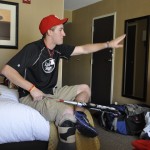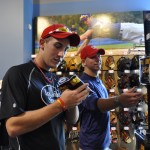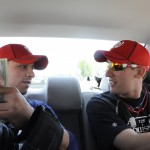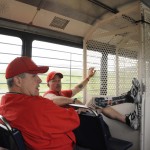- Medill News Service reporter Natalie Brunell films the Wounded Warrior Amputee Softball Team on the bus from their hotel in Washington, Pa. to dinner at a local American Legion outpost. Meghann Myers / Medill
- Wounded Warrior Amputee Softball Team shortstop Sgt. Matt Kinsey describes the perks of his new Louisville Slugger bat. Meghann Myers / Medill
- Wounded Warrior Amputee Softball Team shortstop Sgt. Matt Kinsey (left) and outfielder/retired Sgt. Brian Taylor Urruela do a little shopping at Dick’s Sporting Goods in Pittburgh, Pa. Meghann Myers / Medill
- Wounded Warrior Amputee Softball Team outfielder Brian Taylor Urruela and shortstop Sgt. Matt Kinsey chat on the way to their hotel in Washington, Pa. Meghann Myers / Medill
- Wounded Warrior Amputee Softball Team coach Bucky Weaver (left) and outfielder Todd Reed (right) chat on a Pennsylvania Department of Corrections bus en route to SCI-Green supermax security prison. Meghann Myers / Medill
- Wounded Warriors Amputee Softball Team shortstop Sgt. Matt Kinsey shows off his prosthetic foot. Meghann Myers / Medill
WASHINGTON — Rolling Stone magazine is, more than anything else in the world, the reason I became a journalist. As a teenager, nothing scintillated me more than in-depth profiles of pop culture figures and the intimate details they would share when they let a reporter into their homes, onto their tour buses and past the proverbial velvet ropes.
When the opportunity came for me to live out this dream and Medill signed off, I leapt at the chance. Three days in Western Pennsylvania with the Wounded Warrior Amputee Softball Team. Not only would we be able to sit down with them for interviews and cover their games, we would stay in the same hotel, accompany them on their group buses to events and even join them for catered dinners each night.
There’s no substitute for the kind of detail you pick up when you spend 48 hours with a group of people. Every joke, every subtle bit of drama is fair game. But it only takes a few hours to realize that you might be falling in love with these people, if only figuratively. Particularly when subjects are as sympathetic as these.
A softball team of Purple Hearts, veterans who are missing arms and legs, most lost in attacks or explosions while they were serving in the Iraq or Afghanistan wars. It’s heartrending, zooming in and photographing a guy your age as he sits down on a dugout bench, removes his carbon fiber leg and wipes down what’s left of his shin.
Everyone calls them heroes, and they are, but I knew I had to remind myself that they weren’t actually higher beings. The great thing about embed reporting is that you get to see subjects when they’re cranky in the morning, angry about a lost game in the afternoon and maybe a little tipsy in the evening.
Even though I couldn’t put everything I saw and heard in the story, I made a conscious effort to present the players as something more than the “heroes” that every local newspaper and TV station paints them when they roll into town.
They may have overcome incredible challenges, they might inspire people all around the country, but at the end of the day, they’re still guys doing guy stuff, and that’s important to report as well.
It’s also important to be open-minded and fair when covering a story than to focus on staying neutral. The best writing comes from feeling strongly about the subject, whether negatively or positively.
So I kept that in mind while I joked around with these guys on the bus, led a 90’s boy band sing-along at the bowling alley and walked back to the hotel with them in the wee hours. No matter how much fun I was having, I was still at work. I was still looking at them with a critical eye, thinking about how all of this would fit into my story.
I kept my wits about me, treated it as an exercise in professionalism and it paid off. I got to know them in a way that few reporters had, and when I published the story, it was full of details and anecdotes that no one had reported before.
It was my Rolling Stone moment. Here’s to many, many more.






